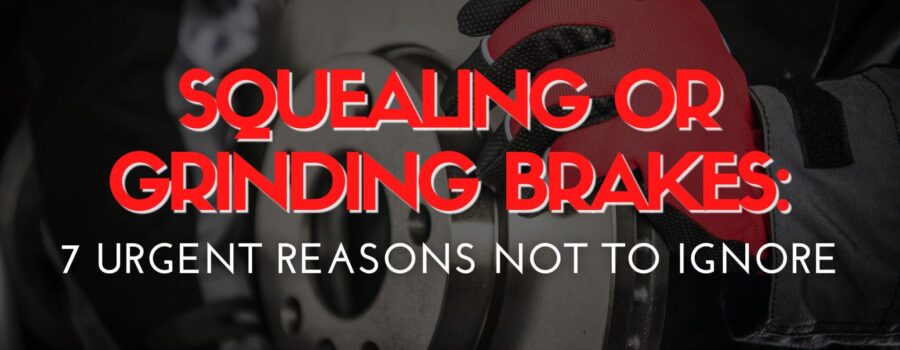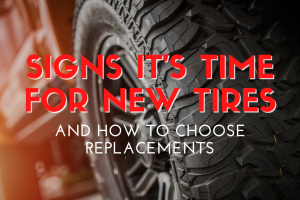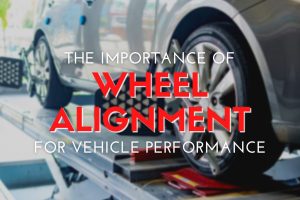Squealing or Grinding Brakes: 7 Urgent Reasons Not to Ignore
Few things are as unsettling as hearing a high-pitched squeal or harsh grinding noise when you press your brake pedal. These sounds are more than just annoying—they can be warning signs of underlying brake issues that affect your safety, your vehicle’s performance, and even your wallet if left unchecked.
Whether you’re commuting through Tuscaloosa traffic or heading out on a road trip across West Alabama, knowing what squealing or grinding brakes mean—and how to handle them—can save you from costly repairs and dangerous situations.
In this blog, we’ll break down why brakes squeal or grind, what it means for your car, and what you should do immediately if you notice these noises.
Why Brakes Make Noise in the First Place
Your brakes work through friction. When you press the brake pedal, the brake pads clamp down on the rotors to slow your vehicle. Over time, friction, heat, dust, and wear take a toll, often causing squealing or grinding.
But not all brake noises are created equal. Some are harmless, while others signal a serious problem. Understanding the difference is the first step in protecting your car and keeping yourself safe on the road.
Common Causes of Squealing Brakes
Brake squealing is one of the most frequent complaints drivers have, and while it can sometimes be temporary, it’s often an early warning sign.
- Worn brake pads – Most modern brake pads come with a wear indicator: a small metal tab designed to squeal when pads get too thin. This is a built-in safety feature letting you know it’s time for a replacement.
- Glazed pads or rotors – Overheating from heavy braking can create a hardened, shiny surface on pads and rotors. This glazing prevents proper friction, leading to squealing and reduced stopping power.
- Dust and debris – Dirt, brake dust, or even small pebbles trapped between the pad and rotor can cause temporary squeaking.
- Moisture – Overnight condensation or rain can cause a thin layer of rust on the rotor surface, which often squeals until it wears off after a few stops.
If squealing happens consistently, it’s a strong sign that you need your brakes inspected.
Common Causes of Grinding Brakes
Grinding sounds are far more serious than squeals and almost always indicate advanced brake wear or damage.
- Completely worn-out brake pads – When pads wear down to the metal backing plate, they grind directly against the rotors, damaging both.
- Damaged rotors – Grooved, warped, or cracked rotors can grind as the pads press against them.
- Foreign objects – Small rocks or debris lodged in the caliper or rotor area can cause grinding noises.
- Faulty calipers – A sticking or seized caliper can create uneven pressure, causing grinding or scraping noises.
Grinding brakes should never be ignored—they’re a sign your braking system has already deteriorated and requires immediate attention.
Why You Should Never Ignore Brake Noises
It may be tempting to turn up the radio and ignore those squeals or grinding sounds, but brake issues escalate quickly. Ignoring them can lead to:
- Longer stopping distances and reduced safety
- Higher repair bills from damaged rotors or calipers
- Complete brake failure in severe cases
- Reduced resale value of your vehicle
Your brakes are your car’s most important safety system. Addressing noises early ensures reliability and peace of mind.
What to Do If You Hear Squealing or Grinding
If you notice squealing or grinding while braking, here’s what you should do immediately:
- Don’t panic, but act quickly – You can usually drive short distances, but grinding brakes in particular should be addressed as soon as possible.
- Inspect your brake fluid level – Low brake fluid can sometimes accompany brake wear.
- Check for visible signs of wear – Look through the wheels to see if pads look thin or rotors look grooved.
- Schedule a professional inspection – Only a certified mechanic can fully diagnose the cause and recommend the right repair.
- Avoid unnecessary driving – Continued driving can make the problem worse and more expensive.
How Brake Inspections Can Save You Money
Getting your brakes checked at the first sign of trouble often means the difference between replacing inexpensive pads and having to replace pads, rotors, and calipers together.
A routine brake inspection usually includes:
- Measuring pad thickness
- Inspecting rotors for wear or warping
- Checking calipers, hoses, and lines
- Testing brake fluid condition
- Looking for leaks or hardware damage
This proactive service can extend the life of your braking system and prevent major repairs.
Brake Maintenance Tips to Prevent Noises
While some brake noises are unavoidable, regular care goes a long way in preventing costly issues. Here’s how you can keep your brakes quiet and effective:
- Schedule brake inspections every 6 months or 6,000 miles
- Replace pads before they reach minimum thickness
- Use high-quality brake pads and rotors for durability
- Keep brake components clean and free of debris
- Address warning lights immediately
Proactive maintenance is always cheaper—and safer—than waiting for grinding noises to appear.
Frequently Asked Questions About Brake Noises
Why do my brakes squeal only in the morning?
Moisture or light rust buildup overnight can cause temporary squealing. If it goes away after a few stops, it’s usually harmless. Persistent squealing means it’s time for a brake check.
How long can I drive with squealing brakes?
If the noise is from the wear indicator, you may have a short time left before pads wear completely. Don’t delay—schedule service soon to avoid rotor damage.
Is grinding always a sign of brake failure?
Grinding almost always indicates severe wear or damage. It means your pads are likely worn through, and rotors may be compromised. Immediate inspection is necessary.
Why do my new brakes squeal?
Sometimes new pads squeal slightly during the break-in period. If the noise doesn’t fade after a week of driving, contact your installer to check for issues.
Can weather affect brake noise?
Yes. Cold, wet, or humid conditions can temporarily cause squealing. But ongoing noise usually points to wear or mechanical issues.
Contact Us
Postle Tire Barn has been serving the tire and automotive needs of the Tuscaloosa and West Alabama area for more than 40 years. Whether you’re dealing with squealing brakes, grinding noises, or need a complete brake inspection, we’re the ones to know.
Give us a call at 205-391-0062 or email us at [email protected]. Our skilled technicians can diagnose brake issues quickly and get your car back on the road safely.





Recent Comments